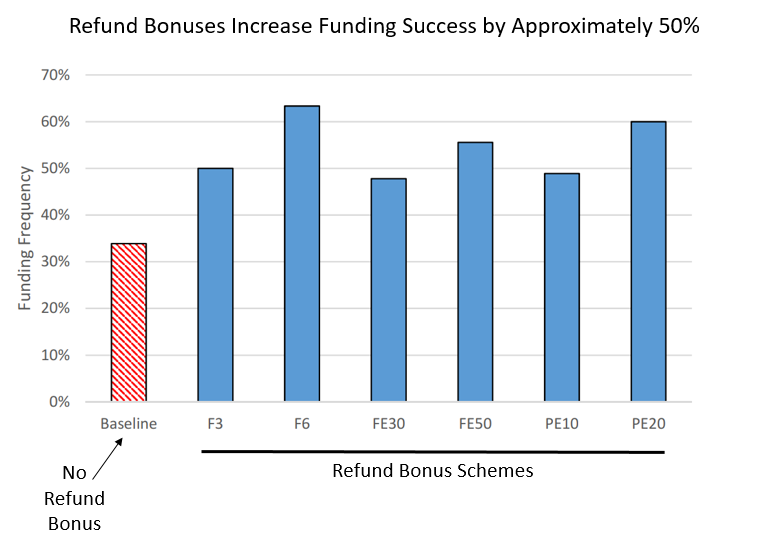Better Crowdfunding
In 1998, I designed the “dominant assurance contract” (DAC) mechanism for producing public goods privately. In my latest paper, just published in GEB written with the excellent Tim Cason and Robertas Zubrickas we test the theory in the lab and…it works! Kickstarter hadn’t yet been created when I first wrote but the DAC mechanism can now be easily explained as a Kickstarter contract with refund bonuses. On Kickstarter and other crowdfunding sites you contribute to a project and if a contribution threshold isn’t reached you get your money back. The Kickstarter contract is useful but it’s still easy for a good project to fail because there are many equilibria with non-funding. For example, if I think that you won’t contribute then I may decide not to contribute and if I don’t contribute then you may decide not to contribute. Neither of us can do better by contributing, given the other person is not-contributing, and so non-contributing is a Nash equilibrium (see my talk at the Foresight Institute for more details). Now introduce refund bonuses which pay out only if the threshold is not reached. Now if I think that you won’t contribute then I want to contribute, to earn the refund bonus, and the same is true for you. Indeed, the only equilibria in the crowdfunding game with refund bonuses have the project being funded. Thus, a nice feature of the refund bonus game is that in equilibrium the refund bonuses are never paid!
To test the theory we (mostly Tim and Robertas!) created an environment very similar to that faced by people on Kickstarter. Namely, there are multiple projects to choose from, each with different private payouts and each project has a contribution threshold and some projects offer refund bonuses. We test a variety of different types of refund bonuses including fixed (e.g. $10) and proportional e.g. (20% of your contribution) and also early refund bonuses (a refund bonus if the contribution threshold is not reached and you agreed to contribute in the first half of the funding period) or for contributions at any point in the game. Our research leads to three important conclusions.
First, without refund bonuses only ~30% of socially valuable projects succeed (perhaps coincidentally almost the exact same as on Kickstarter). But with refund bonuses the success rate increases by about 50% to 50- 60% and it doesn’t much matter much what type of refund bonuses are used!

Second, early refund bonuses have some useful properties. A key to the mechanism is that it quickly makes many contributors pivotal. At the beginning of the game it’s in no single individual’s interest to fund the public good but as others contribute there comes a time when the contribution necessary to push the total funding over the threshold is less than the value of the public good to the individual–thus, for purely self-interested reasons, a potential contributor can benefit by pushing funding just over the threshold. We say such contributors are pivotal. Early refund bonuses make contributors pivotal sooner and we think this gives people time to recognize that pushing funding over the threshold is in their interest. In addition, when more people contribute early this sends a signal of social cooperativeness which also appears important to fund public goods.
Third, refund bonuses pay for themselves! In theory, refund bonuses are never paid but in practice, as we have seen, some socially valuable projects fail even with refund bonuses. Nevertheless, for reasonable markups it’s still in an entrepreneur’s interest to use refund bonuses because the greater success rate more than pays for having to pay modest refund bonuses when a project fails.
We think refund bonuses can substantially improve crowdfunding and we hope to partner with a crowdfunding site to run a field experiment. Contact me if interested!
Read the whole thing.